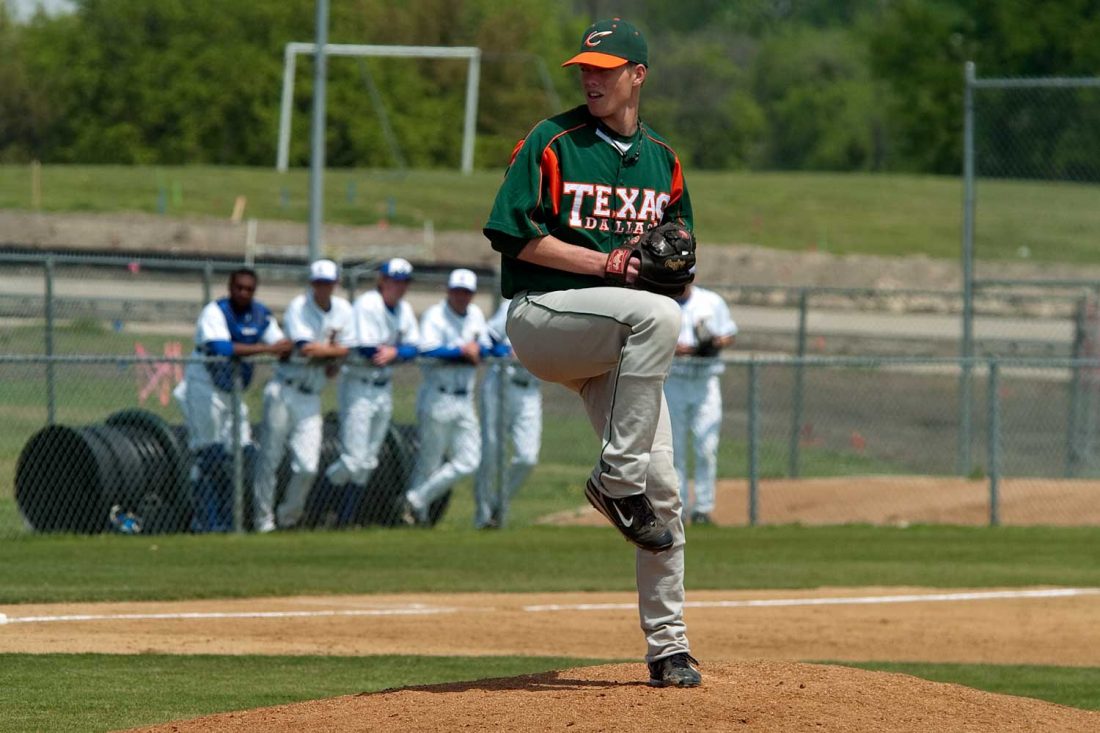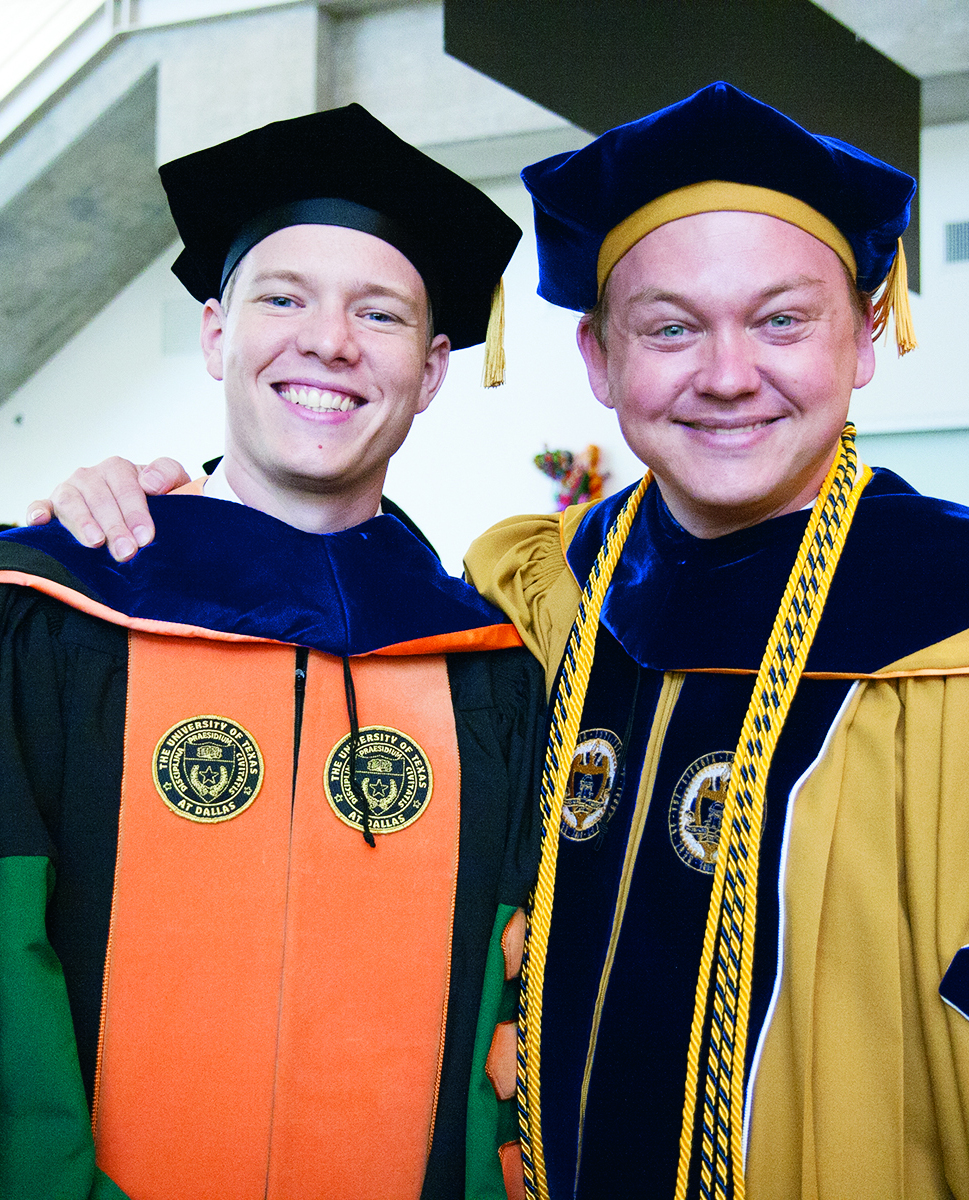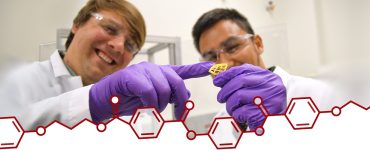Alumni Spotlight: Full Circle
As an undergraduate at UT Dallas, Jonathan Reeder could be found in one of two places: the research lab or the baseball field.
Twice selected as the American Southwest Conference East Division Pitcher of the Week, Reeder, a tall lefty with a decent fastball, won three games and contributed as a middle reliever for the Comets. Refusing to rest on his accolades earned on the pitching mound, Reeder would go on to make a name for himself as a world-class engineer and aspiring entrepreneur.

Reeder, a lefty, throws against LeTourneau University on Friday, April 10, 2009.
After graduating in 2012 as one of five students in the first class of mechanical engineering undergrads, Reeder hung up his baseball mitt for a lab coat and decided to pursue a PhD in materials science and engineering at UT Dallas.
The inspiration to continue in academia came from working with Dr. Walter Voit BS’05, MS’06, Jonsson School associate professor of materials science and engineering and mechanical engineering.
“Before taking Voit’s undergraduate class, I was not even interested in research,” Reeder said.
Specifically, Reeder wanted to make new discoveries in the fields of flexible and stretchable electronics, organic transistors and shape memory polymers to use these materials for biomedical applications in new ways. On his journey toward discovery, it helped that he gained a global perspective: The summer before beginning his doctorate, Reeder was selected to participate in the National Science Foundation (NSF) East Asia and Pacific Summer Institute, and was awarded a National Science Foundation Graduate Research Fellowship.
The fellowship, which took him to the University of Tokyo in Japan, resulted in a publication in the scientific journal Nature. As a co-author, he assisted in the fabrication of electronic circuits that are lighter than a feather and can be crumpled like paper and still retain their electrical properties.
His time in Japan would prove to be useful beyond the summer abroad – Reeder built connections with the Someya Organic Transistor Lab, one of the world’s leaders in flexible and stretchable electronics. This partnership led to other scientific developments and subsequent publications. In 2014, Reeder, Voit and the research group from Tokyo published a paper in the journal Advanced Materials. Reeder, as lead author, detailed how the researchers had created electronic devices that became soft when implanted in the body and could grip objects like tissues, nerves and blood vessels.
Reeder eventually made two more trips to conduct research in Tokyo and co-authored an additional three papers with his Japanese counterparts in Nature Communications, Nature Nanotechnology and Proceedings of the National Academy of Sciences.
“Gaining an international perspective was truly an education in itself,” Reeder said. “I realized that despite the cultural differences, the universal language of science allowed me to make an immediate impact and contribution in the lab.”

Reeder celebrates finishing his PhD with Dr. Walter Voit.
Apart from his NSF fellowship, Reeder was also a recipient of the UT Dallas Eugene McDermott Graduate Fellowship, a program aimed to provide resources and opportunities for professional development and career acceleration for some of the most promising doctoral students. Through the fellowship, he managed his own research fund.
“Support from the McDermott Fellowship led to many opportunities I would not have had otherwise,” he added. “The Fellowship enables grad students to pursue their own ideas without being tethered to any particular project or principal investigator – students can create their own research projects.”
In between globetrotting and leading research on campus, Reeder helped spin out a startup from his work: he led an engineering team toward lab-to-production scale up of flexible sensor applications. His company, Pascalor, focused on commercializing proprietary pressure and temperature sensors developed at the Advanced Polymer Research Lab.
“Although this particular venture has since ended, the startup served as an educational experience – I learned what creating a startup entails and about the process for transferring technology out of an academic lab,” Reeder said.
When four years of studies came to an end in 2016 and Reeder finished his dissertation on thermally responsive soft bioelectronics, he walked the stage to receive his doctoral hood.
Today, this former student-athlete turned engineer is now working to improve the lives of other athletes. Reeder is a Postdoctoral Researcher at Northwestern University where he develops soft, flexible sweat collection systems for athletic performance monitoring. He recently visited the Chicago Cubs, a Major League baseball team, to test out some of his devices during spring training.
“I didn’t think baseball at UT Dallas would later lead to working with professional athletes, and certainly not as an engineer to measure the sweat of these athletes to inform them about their performance and health,” Reeder said. “My journey really has come full circle.”








